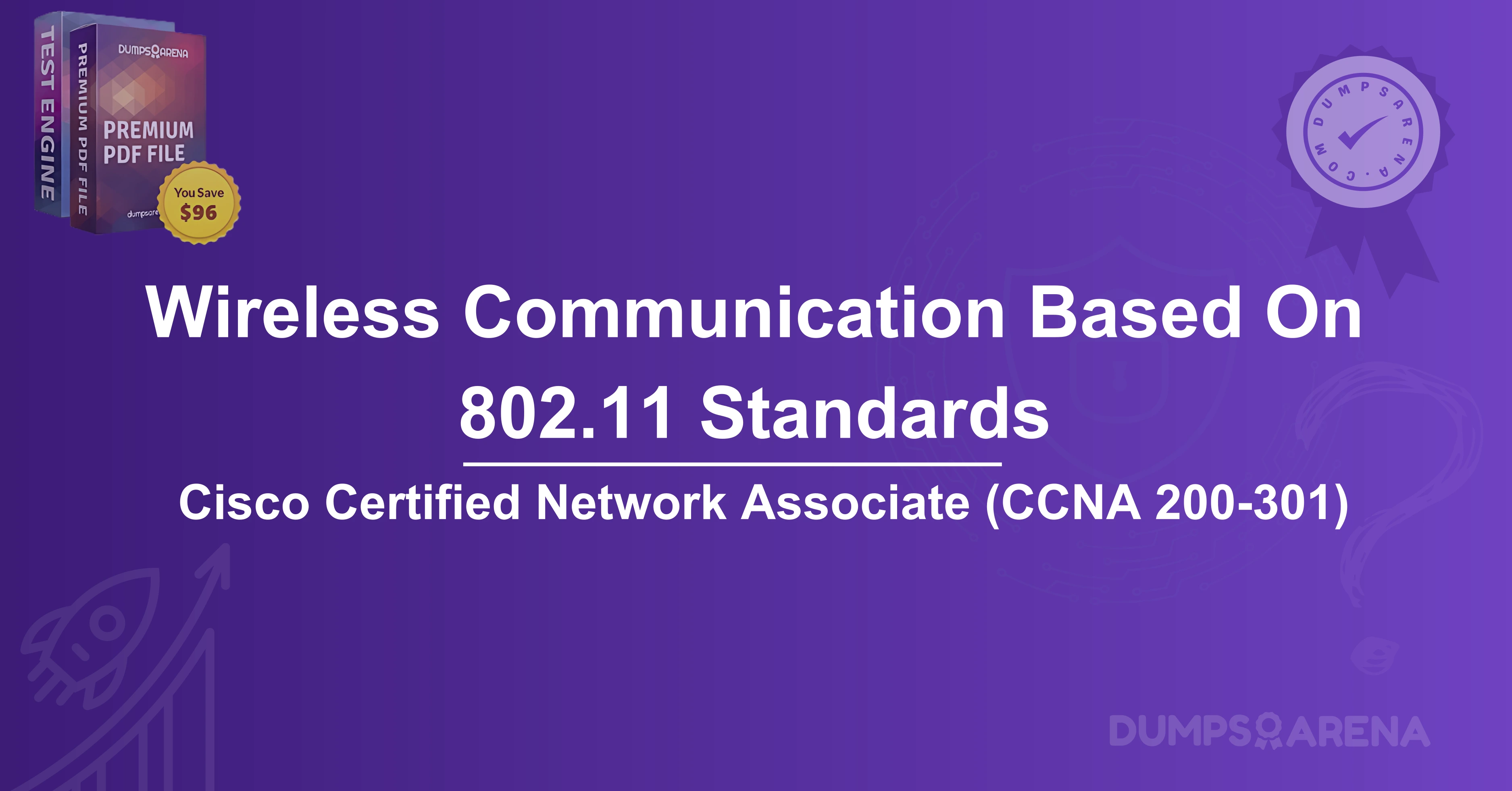Introduction
Wireless communication has become an integral part of our daily lives, enabling seamless connectivity and communication across various devices. Among the many wireless communication standards, the IEEE 802.11 family of standards stands out as the most widely used for Wireless Local Area Networks (WLANs). This article delves into the intricacies of wireless communication based on the 802.11 standards, its relevance to the 200-301 CCNA Cisco Certification exam, and how resources like DumpsArena can aid in exam preparation.
Understanding 802.11 Standards
The IEEE 802.11 standards, commonly referred to as Wi-Fi, define the protocols for implementing wireless local area network (WLAN) communication in various frequency bands, including 2.4 GHz, 5 GHz, and 6 GHz. These standards are developed and maintained by the Institute of Electrical and Electronics Engineers (IEEE) and have evolved over the years to meet the increasing demands for speed, reliability, and security in wireless communication.
Evolution of 802.11 Standards
- 802.11 (1997): The original standard, supporting a maximum data rate of 2 Mbps.
- 802.11b (1999): Introduced support for up to 11 Mbps in the 2.4 GHz band.
- 802.11a (1999): Operates in the 5 GHz band with a maximum data rate of 54 Mbps.
- 802.11g (2003): Combines the benefits of 802.11a and 802.11b, offering 54 Mbps in the 2.4 GHz band.
- 802.11n (2009): Introduced Multiple Input Multiple Output (MIMO) technology, significantly increasing data rates up to 600 Mbps.
- 802.11ac (2013): Operates exclusively in the 5 GHz band, supporting data rates up to several gigabits per second.
- 802.11ax (2019): Also known as Wi-Fi 6, it improves efficiency, capacity, and performance in dense environments.
Key Features of 802.11 Standards
- Frequency Bands: 802.11 standards operate in the 2.4 GHz, 5 GHz, and 6 GHz frequency bands, each offering different advantages in terms of range and bandwidth.
- Modulation Techniques: Various modulation techniques, such as OFDM (Orthogonal Frequency Division Multiplexing), are used to enhance data transmission efficiency.
- MIMO: Multiple Input Multiple Output technology uses multiple antennas to improve communication performance by increasing throughput and range.
- Security: Protocols like WPA3 (Wi-Fi Protected Access 3) provide robust security features to protect wireless networks from unauthorized access and attacks.
Role of 802.11 Standards in the 200-301 CCNA Cisco Certification Exam
The Cisco Certified Network Associate (CCNA) 200-301 exam is a comprehensive certification that validates a candidate's ability to install, configure, operate, and troubleshoot medium-sized routed and switched networks. Wireless communication, particularly the 802.11 standards, plays a significant role in the exam.
Key Topics Covered in the CCNA Exam Related to 802.11 Standards
- Wireless Fundamentals:
- Understanding the basic concepts of wireless communication.
- Differentiating between various 802.11 standards and their applications.
- Knowledge of frequency bands, channels, and their impact on wireless performance.
- Wireless Security:
- Configuring and securing wireless networks using protocols like WPA2 and WPA3.
- Understanding the vulnerabilities associated with wireless networks and how to mitigate them.
- Wireless Network Design:
- Planning and designing wireless networks to ensure optimal coverage and performance.
- Implementing wireless networks in different environments, such as offices, homes, and public spaces.
- Troubleshooting Wireless Networks:
- Identifying and resolving common issues in wireless networks, such as interference, signal strength, and connectivity problems.
- Using diagnostic tools and techniques to troubleshoot wireless networks effectively.
Importance of 802.11 Standards in the CCNA Exam
A thorough understanding of the 802.11 standards is crucial for success in the CCNA exam. Candidates are expected to demonstrate their knowledge of wireless communication principles, security measures, and network design. Mastery of these topics not only helps in passing the exam but also equips candidates with the skills needed to manage real-world wireless networks.
How DumpsArena Can Aid in CCNA Exam Preparation?
Preparing for the CCNA exam can be challenging, especially when it comes to mastering the intricacies of wireless communication based on the 802.11 standards. This is where DumpsArena comes into play. DumpsArena is a reputable online platform that offers a wide range of resources to help candidates prepare for various certification exams, including the CCNA 200-301.
Features of DumpsArena
- Comprehensive Study Materials:
- DumpsArena provides detailed study guides that cover all the topics included in the CCNA exam, including wireless communication and 802.11 standards.
- The study materials are regularly updated to reflect the latest exam objectives and industry trends.
- Practice Exams:
- DumpsArena offers a vast collection of practice exams that simulate the actual CCNA exam environment.
- These practice exams help candidates assess their knowledge, identify areas of improvement, and build confidence.
- Real Exam Dumps:
- The platform provides real exam dumps that contain questions and answers from previous CCNA exams.
- These dumps are invaluable for understanding the exam format and the types of questions that may be asked.
- Interactive Learning Tools:
- DumpsArena features interactive learning tools, such as flashcards and quizzes, to reinforce key concepts and enhance retention.
- These tools make learning more engaging and effective.
- Expert Support:
- DumpsArena offers access to a community of experts and certified professionals who can provide guidance and support throughout the exam preparation process.
- Candidates can ask questions, share experiences, and receive valuable insights from industry experts.
Benefits of Using DumpsArena for CCNA Exam Preparation
- Time Efficiency: DumpsArena's resources are designed to help candidates prepare efficiently, saving time and effort.
- Cost-Effective: The platform offers affordable study materials and practice exams, making it accessible to a wide range of candidates.
- High Success Rate: Many candidates have successfully passed the CCNA exam with the help of DumpsArena's comprehensive resources.
- Flexibility: DumpsArena's online platform allows candidates to study at their own pace and convenience, making it ideal for busy professionals.
Why Choose This Cisco Certification Test?
Choosing a Cisco certification test depends on your career goals, current skill level, and the specific area of IT you want to specialize in. Here are some reasons why you might choose a Cisco certification:
1. Industry Recognition
- Cisco certifications are globally recognized and respected in the IT industry. They validate your skills and knowledge, making you a more attractive candidate to employers.
2. Career Advancement
- Cisco certifications can open doors to higher-paying jobs and more advanced roles, such as network engineer, security specialist, or cloud architect.
3. Skill Validation
- These certifications provide a structured way to validate your expertise in networking, security, collaboration, or other IT domains. They demonstrate your ability to work with Cisco technologies, which are widely used in enterprise environments.
4. Comprehensive Learning Paths
- Cisco offers certifications for various skill levels (entry, associate, professional, expert, and architect) and specializations (routing and switching, security, data center, collaboration, etc.). This allows you to choose a path that aligns with your career aspirations.
5. Hands-On Experience
- Many Cisco certifications require hands-on experience with Cisco equipment and software, ensuring you gain practical skills that are directly applicable in real-world scenarios.
6. Staying Competitive
- The IT landscape is constantly evolving, and Cisco certifications help you stay up-to-date with the latest technologies and best practices.
7. Networking Opportunities
- Being part of the Cisco-certified community gives you access to a network of professionals, forums, and resources that can help you grow in your career.
8. Employer Requirements
- Some employers specifically require or prefer Cisco certifications for certain roles, especially in networking and infrastructure.
Conclusion
Wireless communication based on the 802.11 standards is a critical component of modern networking, and a deep understanding of these standards is essential for success in the CCNA 200-301 exam. The evolution of 802.11 standards has revolutionized wireless networking, offering faster speeds, greater reliability, and enhanced security. As a CCNA candidate, mastering these standards will not only help you pass the exam but also prepare you for real-world networking challenges.
DumpsArena serves as an invaluable resource for CCNA exam preparation, offering comprehensive study materials, practice exams, real exam dumps, and expert support. By leveraging the resources provided by DumpsArena, candidates can enhance their knowledge, build confidence, and increase their chances of passing the CCNA exam with flying colors.
In conclusion, the combination of a solid understanding of 802.11 standards and the right preparation tools, such as those offered by DumpsArena, can significantly boost your chances of achieving CCNA certification and advancing your career in networking.
Get Accurate & Authentic 500+ CCNA 200-301 Exam Questions
1. Which of the following wireless communication technologies is based on the IEEE 802.11 standards?
a) Bluetooth
b) Wi-Fi
c) Zigbee
d) NFC
2. What is the primary purpose of the IEEE 802.11 standards?
a) To enable wired Ethernet communication
b) To provide wireless local area network (WLAN) communication
c) To facilitate cellular network communication
d) To support satellite communication
3. Which of the following is NOT a version of the IEEE 802.11 standard?
a) 802.11a
b) 802.11b
c) 802.11g
d) 802.11z
4. What frequency bands are commonly used by devices based on the IEEE 802.11 standards?
a) 2.4 GHz and 5 GHz
b) 900 MHz and 2.4 GHz
c) 5 GHz and 10 GHz
d) 1.8 GHz and 3.6 GHz
5. Which IEEE 802.11 standard introduced the 5 GHz frequency band?
a) 802.11a
b) 802.11b
c) 802.11g
d) 802.11n
6. Which IEEE 802.11 standard is known for its high throughput and support for MIMO (Multiple Input Multiple Output)?
a) 802.11a
b) 802.11b
c) 802.11n
d) 802.11ac
7. What is the maximum theoretical speed of the 802.11ac standard?
a) 54 Mbps
b) 150 Mbps
c) 600 Mbps
d) 1.3 Gbps
8. Which IEEE 802.11 standard operates exclusively in the 2.4 GHz frequency band?
a) 802.11a
b) 802.11b
c) 802.11ac
d) 802.11ax
9. What is the latest generation of the IEEE 802.11 standard as of 2023?
a) 802.11n
b) 802.11ac
c) 802.11ax (Wi-Fi 6)
d) 802.11be (Wi-Fi 7)
10. Which IEEE 802.11 standard is also known as Wi-Fi 6?
a) 802.11ac
b) 802.11ax
c) 802.11n
d) 802.11g



